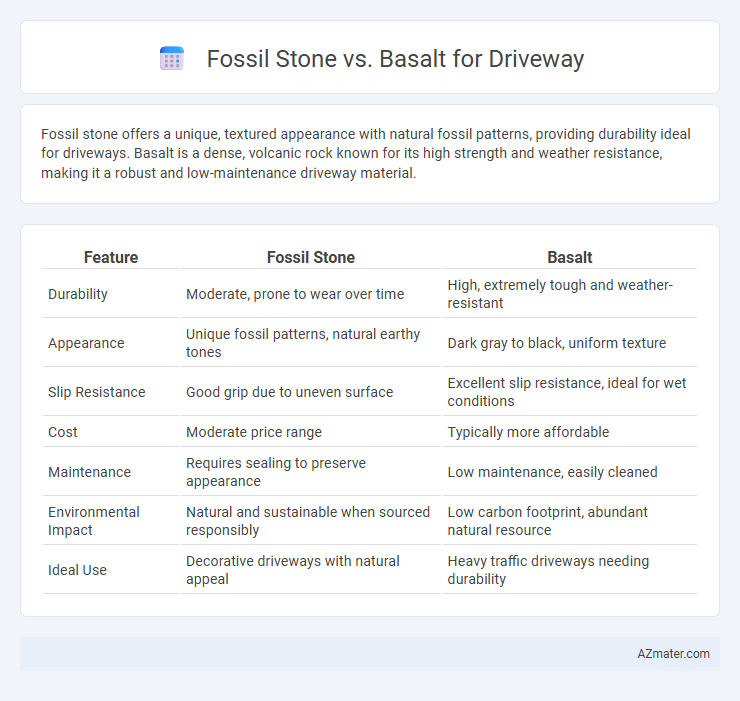Fossil stone offers a unique, textured appearance with natural fossil patterns, providing durability ideal for driveways. Basalt is a dense, volcanic rock known for its high strength and weather resistance, making it a robust and low-maintenance driveway material.
Table of Comparison
| Feature | Fossil Stone | Basalt |
|---|---|---|
| Durability | Moderate, prone to wear over time | High, extremely tough and weather-resistant |
| Appearance | Unique fossil patterns, natural earthy tones | Dark gray to black, uniform texture |
| Slip Resistance | Good grip due to uneven surface | Excellent slip resistance, ideal for wet conditions |
| Cost | Moderate price range | Typically more affordable |
| Maintenance | Requires sealing to preserve appearance | Low maintenance, easily cleaned |
| Environmental Impact | Natural and sustainable when sourced responsibly | Low carbon footprint, abundant natural resource |
| Ideal Use | Decorative driveways with natural appeal | Heavy traffic driveways needing durability |
Introduction to Fossil Stone and Basalt for Driveways
Fossil stone, composed of ancient marine fossils embedded in limestone, offers a unique, textured surface ideal for decorative driveways that emphasize natural aesthetics and historical character. Basalt, an igneous volcanic rock, provides exceptional durability and resistance to heavy loads, making it a popular choice for driveways requiring long-lasting, high-strength materials. Both materials present distinct benefits, with fossil stone highlighting visual appeal and basalt emphasizing structural performance for driveway applications.
Material Composition: Fossil Stone vs Basalt
Fossil stone, composed primarily of sedimentary limestone rich in preserved marine fossils, offers unique texture and visual appeal with softer mineral content, making it more porous and less dense. Basalt, a dense igneous volcanic rock made mostly of plagioclase and pyroxene minerals, provides superior hardness, durability, and resistance to wear and weathering for high-traffic driveways. The material composition difference directly impacts longevity, maintenance requirements, and aesthetic characteristics, with basalt excelling in strength and fossil stone valued for decorative uniqueness.
Aesthetic Appeal and Visual Differences
Fossil stone driveways offer a unique aesthetic with intricate, natural fossil patterns that create a vintage and elegant look, contrasting sharply with basalt's uniform, dark gray to black coloration that provides a sleek, modern appeal. The textured surface of fossil stone brings depth and visual interest, making each driveway distinctly eye-catching, while basalt's smooth, dense composition emphasizes minimalism and durability. Choosing between fossil stone and basalt largely depends on the desired visual impact, with fossil stone enhancing historical charm and basalt emphasizing contemporary sophistication.
Durability and Longevity Comparison
Fossil stone and basalt both offer high durability for driveways, but basalt is renowned for its exceptional hardness and resistance to weathering, making it ideal for heavy traffic areas. Fossil stone, composed mainly of ancient marine sediments, provides moderate durability but may be more prone to erosion and surface wear over time. In terms of longevity, basalt driveways can last several decades with minimal maintenance, whereas fossil stone surfaces may require periodic sealing and repairs to maintain their structural integrity.
Maintenance Requirements and Upkeep
Fossil stone driveways require minimal maintenance due to their natural durability and resistance to weathering, often needing just occasional cleaning to remove debris and prevent moss growth. Basalt driveways, while highly durable and capable of withstanding heavy traffic, may require more frequent sealing to maintain their appearance and prevent water infiltration that causes surface damage. Both materials benefit from proper installation and periodic inspection to ensure longevity, but fossil stone generally demands less upkeep compared to basalt.
Slip Resistance and Safety Considerations
Fossil stone offers moderate slip resistance due to its textured surface, making it a safer choice for driveways in wet conditions compared to smoother materials. Basalt provides excellent slip resistance because of its naturally rough, fine-grained texture, enhancing traction even during rain or ice. When prioritizing safety, basalt is often favored for driveway applications to reduce the risk of slips and falls, especially in regions with frequent moisture.
Installation Process and Costs
Fossil stone driveways require precise installation involving careful cutting and fitting due to their unique texture and irregular shapes, which can increase labor costs compared to basalt. Basalt, being dense and uniform, allows for more straightforward, quicker installation with less waste, reducing overall labor expenses. Material costs vary, with fossil stone often priced higher due to its rarity and aesthetic appeal, while basalt remains a cost-effective, durable option suitable for high-traffic driveways.
Environmental Impact of Fossil Stone vs Basalt
Basalt is a natural volcanic rock with minimal environmental impact due to its abundant availability and low energy extraction processes, making it a sustainable choice for driveways. Fossil stone, often derived from sedimentary layers containing ancient organic material, may involve more intensive quarrying and processing, leading to higher carbon emissions and habitat disruption. Choosing basalt supports reduced ecological footprint by minimizing resource depletion and promoting durability in driveway construction.
Regional Availability and Sourcing
Fossil stone, predominantly found and quarried in regions with rich sedimentary rock formations such as parts of the UK and the US, tends to have limited availability and higher sourcing costs due to specialized extraction processes. Basalt, being an abundant volcanic rock, is widely available in areas with historic or current volcanic activity, including the Pacific Northwest in the US, parts of Scandinavia, and Italy, making it a more cost-effective choice for driveways in those regions. Regional availability directly influences transportation expenses, with locally sourced basalt often reducing overall project costs compared to fossil stone, which may require longer shipping routes.
Choosing the Best Stone for Your Driveway Needs
Fossil stone offers a unique, eye-catching texture with natural fossil imprints, ideal for decorative driveways requiring aesthetic appeal and moderate durability. Basalt is a dense, volcanic rock known for its exceptional strength and wear resistance, making it perfect for high-traffic driveways demanding long-lasting performance. Selecting the best stone depends on balancing visual preference with functional needs such as load-bearing capacity and climate resilience.

Infographic: Fossil stone vs Basalt for Driveway
 azmater.com
azmater.com